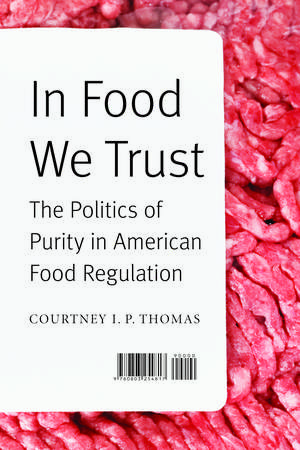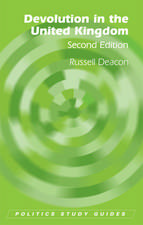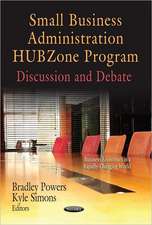In Food We Trust: The Politics of Purity in American Food Regulation: At Table
Autor Courtney I. P. Thomasen Limba Engleză Hardback – 31 oct 2014
In Food We Trust is the first comprehensive examination of the history of food safety policy in the United States, analyzing critical moments in food safety history from Upton Sinclair’s publication of The Jungle to Congress’s passage of the 2010 Food Safety Modernization Act. With five case studies of significant food safety crises ranging from the 1959 chemical contamination of cranberries to the 2009 outbreak of salmonella in peanut butter, In Food We Trust contextualizes a changing food regulatory regime and explains how federal agencies are fundamentally limited in their power to safeguard the food supply.
Din seria At Table
-
 Preț: 211.14 lei
Preț: 211.14 lei -
 Preț: 134.62 lei
Preț: 134.62 lei -
 Preț: 132.16 lei
Preț: 132.16 lei -
 Preț: 97.91 lei
Preț: 97.91 lei -
 Preț: 128.67 lei
Preț: 128.67 lei -
 Preț: 106.83 lei
Preț: 106.83 lei -
 Preț: 98.95 lei
Preț: 98.95 lei -
 Preț: 86.98 lei
Preț: 86.98 lei -
 Preț: 108.71 lei
Preț: 108.71 lei -
 Preț: 149.48 lei
Preț: 149.48 lei -
 Preț: 135.03 lei
Preț: 135.03 lei -
 Preț: 92.77 lei
Preț: 92.77 lei -
 Preț: 119.16 lei
Preț: 119.16 lei -
 Preț: 153.22 lei
Preț: 153.22 lei -
 Preț: 160.63 lei
Preț: 160.63 lei -
 Preț: 132.81 lei
Preț: 132.81 lei -
 Preț: 168.25 lei
Preț: 168.25 lei -
 Preț: 135.03 lei
Preț: 135.03 lei -
 Preț: 180.44 lei
Preț: 180.44 lei -
 Preț: 112.59 lei
Preț: 112.59 lei -
 Preț: 250.73 lei
Preț: 250.73 lei -
 Preț: 138.34 lei
Preț: 138.34 lei -
 Preț: 175.67 lei
Preț: 175.67 lei -
 Preț: 207.85 lei
Preț: 207.85 lei -
 Preț: 221.16 lei
Preț: 221.16 lei -
 Preț: 361.73 lei
Preț: 361.73 lei -
 Preț: 432.39 lei
Preț: 432.39 lei -
 Preț: 427.77 lei
Preț: 427.77 lei -
 Preț: 217.52 lei
Preț: 217.52 lei -
 Preț: 218.54 lei
Preț: 218.54 lei -
 Preț: 100.83 lei
Preț: 100.83 lei -
 Preț: 103.48 lei
Preț: 103.48 lei -
 Preț: 186.09 lei
Preț: 186.09 lei
Preț: 328.90 lei
Nou
Puncte Express: 493
Preț estimativ în valută:
62.94€ • 68.35$ • 52.87£
62.94€ • 68.35$ • 52.87£
Carte tipărită la comandă
Livrare economică 23 aprilie-07 mai
Preluare comenzi: 021 569.72.76
Specificații
ISBN-13: 9780803254817
ISBN-10: 0803254814
Pagini: 288
Ilustrații: 1 table, 1 figure, 2 appendixes, index
Dimensiuni: 152 x 229 x 26 mm
Greutate: 0.59 kg
Editura: Nebraska
Colecția University of Nebraska Press
Seria At Table
Locul publicării:United States
ISBN-10: 0803254814
Pagini: 288
Ilustrații: 1 table, 1 figure, 2 appendixes, index
Dimensiuni: 152 x 229 x 26 mm
Greutate: 0.59 kg
Editura: Nebraska
Colecția University of Nebraska Press
Seria At Table
Locul publicării:United States
Notă biografică
Courtney I. P. Thomas is a visiting assistant professor of political science at Virginia Tech. She is the author of International Political Economy: Navigating the Logic Streams, an Introduction.
Cuprins
List of Illustrations
Preface
Acknowledgments
Introduction: A Twentieth-Century Problem
Preface
Acknowledgments
Introduction: A Twentieth-Century Problem
Part 1: The U.S. Food Safety Regulatory Regime
1. Escape from the Jungle
2. The Cranberry Crisis
3. Science and Politics Collide
Part 2: Crises, Scandals, and Food Safety Regulation
4. Models of Food Safety Regulation
5. Pandora's Jack in the Box
6. From Spinach to GAPs
Part 3: A New Regime for the Twenty-first Century
7. The Peanut Butter Crisis
8. The Future of Food Safety
Epilogue: A Twenty-first-Century Mandate
Appendix A. Recall List from 2008-9 Peanut Outbreak
Appendix B. Food Safety Proposals before the 111th Congress
Notes
Notes
Bibliography
Index
Index
Recenzii
"An important contribution to the fields of regulatory politics and food policy."—A. Bryce Hoflund, Political Science Quarterly
"Thomas has written an exceptionally good synthesis of the history of food regulation in America and contextualized the changing regulatory regime. . . . This book's provocative arguments and detailed examples make it ideal for students and researchers of public health-related disciplines, food regulatory agencies, and those who are interested in American food safety regulations."—Fremont Hung, Food, Culture and Society
"With this new awareness of the processes and politics behind the food in their pantries and refrigerators, readers of In Food We Trust will be hard pressed to subscribe to the myth of the safety of the national food supply."—Jessica Derleth, Journal of American Culture
“Courtney Thomas has written a valuable and significant book that examines the evolving challenge of governing complex networked food safety systems that involve actors at multiple levels and with varied interests.”—Bryan McDonald, author of Food Security
“In Food We Trust is as interesting as it is frightening. Like Upton Sinclair before her, Courtney Thomas is aiming for both the public’s mind and stomach and hits both spot on.”—Nik Heynen, professor of geography at the University of Georgia and coeditor of Neoliberal Environments: False Promises and Unnatural Consequences












